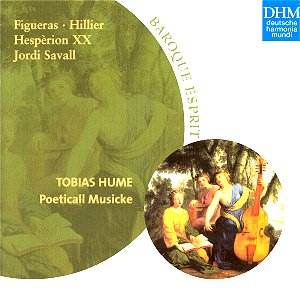
Tobias HUME (1569 ? - 1645)
Poeticall musicke
1. The Lady of Sussex delight
2. The King of Denmarks delight
3. The Duke of Lenox delight
4. French almaine
5. A merry conceit
6. What greater griefe (w/ soprano)
7. Sweet musicke
8. The Earle of Salisburies favoret
9. The Earle of Arundels favoret
10. Fain would I change that note
11. The Earle of Pembrookes galiard
12. The souldiers song
13. The Lady Canes delight
14. The pashion of musicke
15. The Duke of Holstones delight
16. Alas poore men
17. A masque
18. Tobacco
19. A jigg for ladies
![]() Montserrat Figueras, soprano
Montserrat Figueras, soprano
Paul Hillier, bass
Hespèrion XX - Jordi Savall
Rec: February, March, May 1983
![]() DEUTSCHE HARMONIA MUNDI
05472 77847 2 [58.19]
DEUTSCHE HARMONIA MUNDI
05472 77847 2 [58.19]
Superbudget
BUY NOW